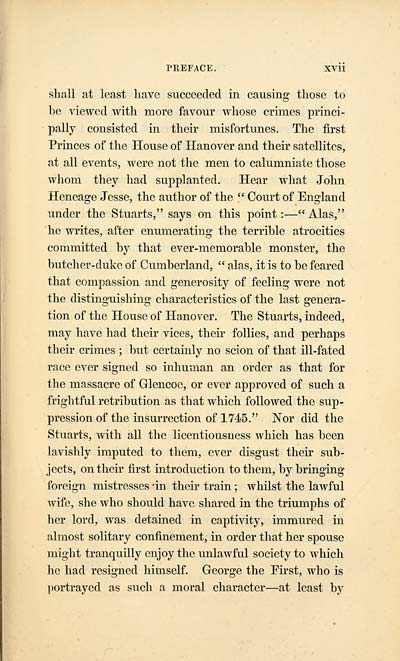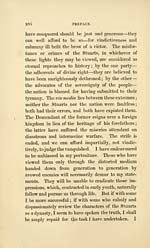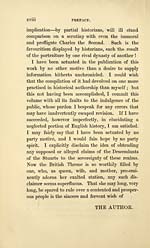Descendants of the Stuarts
(35) Page xvii
Download files
Complete book:
Individual page:
Thumbnail gallery: Grid view | List view

TREFACE. XVll
shall at least have succeeded in causing those to
be viewed with more favour whose crimes princi-
pally consisted in their misfortunes. The first
Princes of the House of Hanover and their satellites,
at all events, were not the men to calumniate those
whom they had supplanted. Hear what John
Heneage Jesse, the author of the " Court of England
under the Stuarts," says on this point : — " Alas,"
he writes, after enumerating the terrible atrocities
committed by that ever-memorable monster, the
butcher-duke of Cumberland, " alas, it is to be feared
that compassion and generosity of feeling were not
the distinguishing characteristics of the last genera-
tion of the House of Hanover. The Stuarts, indeed,
may have had their vices, their follies, and perhaps
their crimes ; but certainly no scion of that ill-fated
race ever signed so inhuman an order as that for
the massacre of Glencoe, or ever approved of such a
frightful retribution as that which followed the sup-
pression of the insurrection of 1745." Nor did the
Stuarts, with all the licentiousness which has been
lavishly imputed to them, ever disgust their sub-
jects, on their first introduction to them, by bringing
foreign mistresses in their train ; whilst the lawful
wife, she who should have shared in the triumphs of
her lord, was detained in captivity, immured in
almost solitary confinement, in order that her spouse
might tranquilly enjoy the unlawful society to which
he had resigned himself. George the Eirst, who is
portrayed as such a moral character — at least by
shall at least have succeeded in causing those to
be viewed with more favour whose crimes princi-
pally consisted in their misfortunes. The first
Princes of the House of Hanover and their satellites,
at all events, were not the men to calumniate those
whom they had supplanted. Hear what John
Heneage Jesse, the author of the " Court of England
under the Stuarts," says on this point : — " Alas,"
he writes, after enumerating the terrible atrocities
committed by that ever-memorable monster, the
butcher-duke of Cumberland, " alas, it is to be feared
that compassion and generosity of feeling were not
the distinguishing characteristics of the last genera-
tion of the House of Hanover. The Stuarts, indeed,
may have had their vices, their follies, and perhaps
their crimes ; but certainly no scion of that ill-fated
race ever signed so inhuman an order as that for
the massacre of Glencoe, or ever approved of such a
frightful retribution as that which followed the sup-
pression of the insurrection of 1745." Nor did the
Stuarts, with all the licentiousness which has been
lavishly imputed to them, ever disgust their sub-
jects, on their first introduction to them, by bringing
foreign mistresses in their train ; whilst the lawful
wife, she who should have shared in the triumphs of
her lord, was detained in captivity, immured in
almost solitary confinement, in order that her spouse
might tranquilly enjoy the unlawful society to which
he had resigned himself. George the Eirst, who is
portrayed as such a moral character — at least by
Set display mode to:
![]() Universal Viewer |
Universal Viewer | ![]() Mirador |
Large image | Transcription
Mirador |
Large image | Transcription
Images and transcriptions on this page, including medium image downloads, may be used under the Creative Commons Attribution 4.0 International Licence unless otherwise stated. ![]()
| Histories of Scottish families > Descendants of the Stuarts > (35) Page xvii |
|---|
| Permanent URL | https://digital.nls.uk/94928398 |
|---|
| Description | A selection of almost 400 printed items relating to the history of Scottish families, mostly dating from the 19th and early 20th centuries. Includes memoirs, genealogies and clan histories, with a few produced by emigrant families. The earliest family history goes back to AD 916. |
|---|

